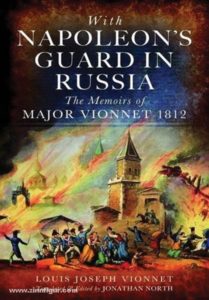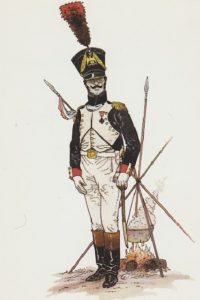 With Napoleon’s Guard in Russia: The Memoirs of Major Vionnet, 1812
With Napoleon’s Guard in Russia: The Memoirs of Major Vionnet, 1812
by Louis Joseph Vionnet
Translated and edited by Jonathan North
In this extract from Vionnet’s memoirs, the eponymous survivor and his rapidly dwindling regiment quit Smolensk and head for Poland. On the way they are stopped by Russian attempts to bar their pro gress. The ensuing battle at Krasnoe that November of 1812 is desperate and horrific:
gress. The ensuing battle at Krasnoe that November of 1812 is desperate and horrific:
On the 14th of November, with the cold now unbearable, we left Smolensk and camped some 18 miles from the city in some woods. The snow was six foot deep. The road was completely iced over, and the horse kept on slipping and falling. Many hundreds were then killed, and others simply died of misery. One of my servants was leading two of my horses, which were carrying some provisions, was murdered by some soldiers who stole everything they could and killed one of the horses. The other horse fell into the hands of the Cossacks.
Destruction at Krasnoe
On the 15th of November we slept in some barns at Krasnoe [Krasny]. During the night of the 15th to 16th we were sent out to attack a village [Malievo] then being held by the Russian vanguard. We managed to seize and hold the village. A large number of Russians were either killed or taken prisoner. On our side we had a few soldiers and some officers killed or wounded. I had five bullets lodged in my riding coat and was bruised twice by spent bullets. We returned to Krasnoe following this expedition, and spent the night there.
On the 17th we marched out in order to take up a position to protect I Corps, then acting as the rearguard as it arrived. What followed was a serious affair in which we lost a large number of officers and soldiers. The first regiments of Voltigeurs and Tirailleurs of the Guard were entirely destroyed – only a total of 120 men from both units remained. The two Fusilier regiments also suffered heavily. I had two horses killed beneath me.
Just before Krasnoe there was a ravine crossed by a small bridge. That bridge was soon so clogged with wagons pushing forwards in their haste to get across, that it proved impossible to either go forwards or have them taken back. So it was that we were forced to abandon everything that remained on the far side. A young lady, very well dressed, with shoes made from white satin, was forced to abandon her coach and was now obliged to continue on foot. She was carrying in her arms an infant of two or three months. Close by my battalion she lost her shoes, but continued onwards in bare feet, looking at her baby and occasionally raising her eyes up towards heaven.
Just at that moment we were hit by a large number of roundshot, canister and musketry. The woman didn’t seem at all troubled, and perhaps even envied the fate of those who were killed and whose bodies now littered the plain. She went on, until I lost sight of her.
My left leg was badly hurt when my horse collapsed on top of it. The horse’s leg had been carried off by an exploding shell. At the same time precisely I was also hit by a bullet in my right side which caused me some bruising. Once I Corps had passed over the ravine, we fell back through Krasnoe. Just behind that town the road runs through a hollow caused by some elevated ground. The enemy had placed four guns and two howitzers here and these were inflicting heavy casualties. We did not have any artillery to drive them back and so we had to march forwards and run the gauntlet, there being no possibility of passing through to the left or the right of the road. Every one of the enemy’s shots found its mark. The shells could not miss or pass over and every one of them killed or blew the legs off those in the way, wounding those when the impact of the shell was deflected by dead bodies. You can be the judge of the butchery occasioned by this battery of guns – everyone who witnessed it was discouraged and shocked as they watched the massacre. That evening, as night fell, we camped near a poor house in which the emperor was lodged.
On the 18th, the retreat continued. On the 19th we crossed over the Borysthenes at Orsha and on the 20th we were at Dobrouna. On the 21st we were at Oriba, on the 22nd at Kokanova and, on the 23rd, we were at Bobr.
The cold was absolutely unbearable, and was especially so as the army had absolutely nothing to eat. A vast number of men were now dying from want. Their bodies covered the roads. Our bodies were so very weak that for much of the time the soldiers barely had the strength to light any fires, and often ate their horseflesh raw.